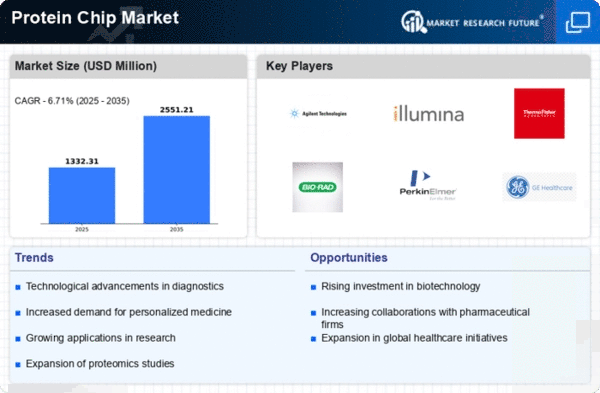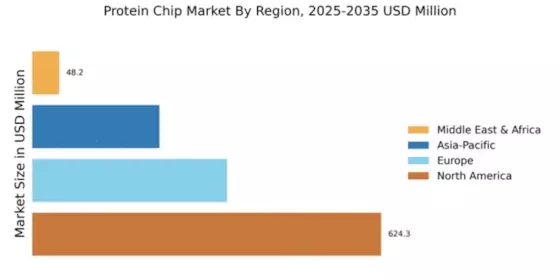Market Trends and Growth Projections
The Global Protein Chip Market Industry is characterized by dynamic trends and growth projections that reflect its evolving landscape. The market is anticipated to grow from 1.25 USD Billion in 2024 to 2.55 USD Billion by 2035, indicating a robust trajectory. The compound annual growth rate of 6.7% from 2025 to 2035 suggests that the industry is poised for sustained growth, driven by technological advancements, increasing applications in various fields, and heightened investment in research. These trends underscore the importance of protein chips in addressing contemporary challenges in healthcare and biotechnology.
Rising Prevalence of Chronic Diseases
The Global Protein Chip Market Industry is also being propelled by the rising prevalence of chronic diseases, which necessitate advanced diagnostic and monitoring tools. Protein chips offer a promising solution for the early detection and management of conditions such as cancer, diabetes, and cardiovascular diseases. As healthcare systems worldwide strive to improve patient outcomes, the demand for innovative diagnostic technologies is likely to increase. This trend is expected to contribute to the market's growth, with projections indicating a significant expansion in the coming years. The ability of protein chips to provide rapid and accurate results positions them as essential tools in modern healthcare.
Rising Demand for Personalized Medicine
The Global Protein Chip Market Industry is experiencing a surge in demand for personalized medicine, driven by advancements in genomics and proteomics. As healthcare shifts towards tailored treatments, protein chips play a crucial role in biomarker discovery and patient stratification. This trend is reflected in the projected market growth, with the industry expected to reach 1.25 USD Billion in 2024. Personalized medicine not only enhances treatment efficacy but also minimizes adverse effects, making it a focal point for healthcare providers and researchers alike. The integration of protein chips into clinical workflows is likely to accelerate, further propelling market expansion.
Increased Investment in Biotechnology Research
Investment in biotechnology research is a significant driver of the Global Protein Chip Market Industry. Governments and private entities are allocating substantial funds to support research initiatives that leverage protein chips for various applications, including diagnostics and therapeutic development. This influx of capital is likely to enhance research capabilities and foster innovation within the industry. As a result, the market is expected to benefit from a robust pipeline of new products and technologies. The emphasis on biotechnology research aligns with global health priorities, suggesting that the protein chip market will continue to thrive as funding and interest in this sector grow.
Technological Advancements in Protein Chip Technology
Technological innovations are significantly influencing the Global Protein Chip Market Industry. Enhanced sensitivity, specificity, and multiplexing capabilities of protein chips are enabling researchers to conduct high-throughput analyses with greater accuracy. For instance, the development of microarray technology has revolutionized protein profiling, allowing for the simultaneous detection of thousands of proteins. As these technologies evolve, they are expected to drive market growth, with projections indicating a market size of 2.55 USD Billion by 2035. The continuous improvement in chip design and manufacturing processes suggests that the industry will likely witness increased adoption across various research and clinical applications.
Growing Applications in Drug Discovery and Development
The Global Protein Chip Market Industry is witnessing increased applications in drug discovery and development, as protein chips facilitate the identification of potential drug targets and biomarkers. Pharmaceutical companies are increasingly utilizing these tools to streamline their research processes, thereby reducing time and costs associated with drug development. The integration of protein chips into high-throughput screening platforms is becoming more prevalent, which could lead to a compound annual growth rate of 6.7% from 2025 to 2035. This growth trajectory indicates that the industry is poised for substantial expansion as the demand for efficient drug discovery methods continues to rise.


















